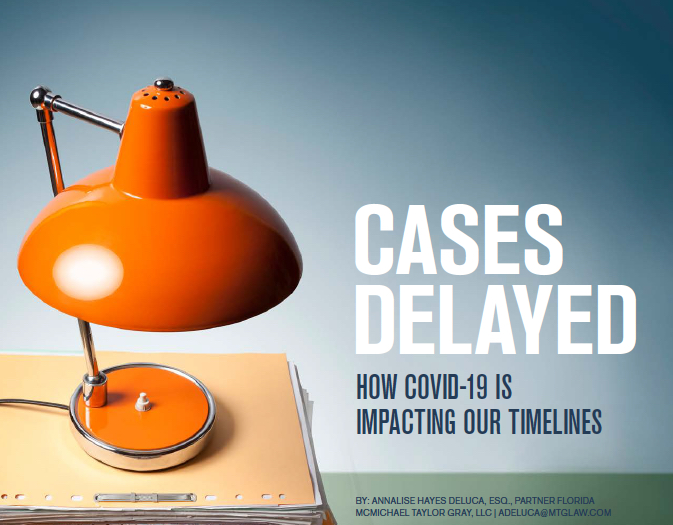McMichael Taylor Gray, LLC Partner, Annalise Hayes Deluca wrote an article entitled “CASES DELAYED – How Covid- 19 Is Impacting Our Timelines” for the Winter issue of ALFN. This article is a good overview of potential issues that may arise as we navigate our new normal. . (See pages 20 and 21)
The only things to do in these unprecedented times are to adjust our expectations, anticipate the delays, and plan accordingly to deliver the same level of service, albeit at a slower pace.
At the beginning of the pandemic, the reasons as to why cases were delayed were fairly obvious: court closures, staffing issues, new restrictions, and moratoriums that needed to be implemented and assessed, just to name a few. Now that we’re beginning a new year, still in the thick of the pandemic, what is causing the delay now? Many courts are open again, if not to the general public, then at least to staff. We’ve also had time to adjust to the restrictions and moratoriums and how to proceed within their limitations. With many expiring or set to expire, shouldn’t we be seeing delays improve? Not necessarily.
One cause for delay that is perhaps less apparent, is the budget issues faced by Clerk’s Offices throughout the State of Florida. The financial implications of the pandemic have not only been felt by the borrowers, tenants, servicers, and lenders, but also the local governments. With fewer people on the road, less traffic citations have been issued than normal. The revenue from traffic citations helps fund court operations. Without that money and without the collection of other fees and court costs, the Clerk’s Offices cannot fully staff their offices or handle the backlog of cases. Foreclosure filing fees are also a large source of revenue for the Courts. Following a statewide moratorium on foreclosures, it is difficult, if not impossible, to make up the revenue. In some Counties, budget cuts have led to the loss of millions of dollars. Without that money, the counties cannot afford to maintain staffing levels that can keep up with the current case level, let alone any substantial increase in cases.
Another cause for delay will be the deluge of filings once the current restrictions and moratoriums are lifted. The defaults on mortgages and the nonpayment of rent haven’t dropped off, they have merely been put off. Each time the moratoriums and holds are extended, the case load continues to pile up. When the moratoriums expire, and the holds are removed, the rush to get the cases into action will cause a massive backlog for the Clerks’ Offices. It takes time to process filings, and even with moratoriums and restrictions in place and fewer new cases as a result, the Clerks are still behind. Depending on the County, it currently may take a week for a new filing to be accepted and another week or two for the summonses to be issued. That is weeks from the time the complaint is filed before it can even really begin. If the Clerks cannot keep up with the volume of cases at this time, it is an almost certainty that they will be unable to do so as the number of filings grow.
However, it is not only Clerks that are experiencing a backlog, but also Judges. Despite the convenience of the Zoom format, many Judges simply do not have the time on their calendars to hear all the pending cases. In some instances, lawyers who are following up on the status of their cases, and assistants who are attempting to schedule hearings, are finding that the only available dates are a month or two out. Trials are also being set four to five months out after having been delayed or bumped to the next Trial docket. Judges, Judicial Assistants, and attorneys are all trying to make up for the hearings that were postponed at the beginning of the pandemic, but the sheer number is overwhelming. These delays make it harder to clear out cases at a normal pace, meaning the Judges are left with larger case loads as new cases keep coming in. Everyone is struggling to adjust and catch up, but there just aren’t enough resources or time.
What about delays in the cases that are pending or may have already been concluded, but have otherwise been stayed due to COVID-19? In Miami-Dade County alone, there are nearly 2,000 Writs of Possession waiting to be served by the Miami-Dade Police Department. The Police Department is not currently moving forward with lockouts on evictions filed after March 13, 2020. To put that in perspective, over 4,500 evictions were filed in Miami-Dade County in just the last three months of 2020. Between Broward and Miami-Dade Counties, there are over 7000 pending eviction cases combined. Those numbers will only continue to increase. Add to that the volume of cases waiting to be filed once the CDC eviction moratorium expires and the limited resources of the police departments, and you will see a massive delay in the return of possession of property to the landlords.
Although the causes may have changed, the fact remains the same- delays are going to be a new normal, at least for the foreseeable future. Whether it is a pending case, a case waiting to be filed, or a case that is subject to a moratorium, this coming year will prove to be more of a waiting game. Limited staffing and financial resources for our Clerks, limited time for our Judges, and backlogs for all mean more of the hurry up and wait we have come to expect from this pandemic. The only things to do in these unprecedented times are to adjust our expectations, anticipate the delays, and plan accordingly to deliver the same level of service, albeit at a slower pace.






